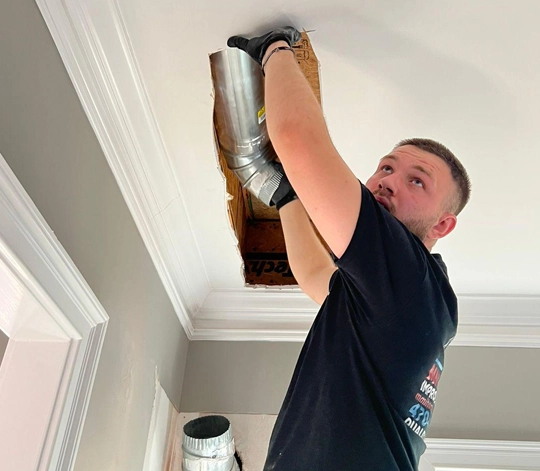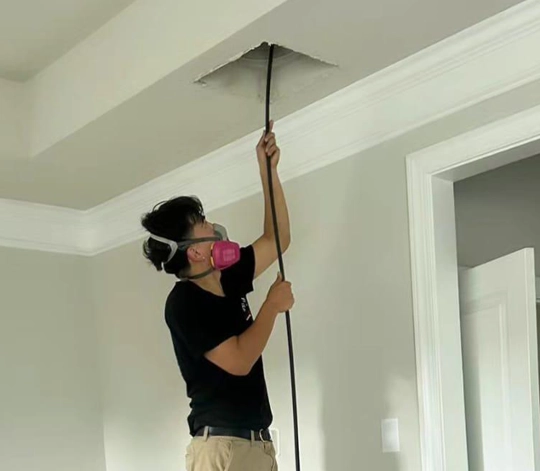Maintaining good indoor air quality is important for a healthy and comfortable home. This guide will explain the basics criteria of indoor air quality and why testing it is so important. If you’re in Smyrna, MMI Home Improvement Pro is a great choice for Indoor Air Quality Testing in smyrna.
What Is Indoor Air Quality Testing?
Indoor Air Quality Testing checks the air in your home or office for dirt particles and other issues. This test helps you find problems and the key criteria for indoor air quality.
For more information, read: How to Improve Indoor Air Quality,


Key Pollutants to Watch For
Here are some common pollutants that can harm the air inside your home:
- Dust and Smoke Particles (PM2.5 and PM10): These tiny particles come from things like dust, smoke, and car exhaust. They can cause problems for your lungs and heart. The World Health Organization (WHO) says these particles are harmful.
- Chemicals from Paints and Cleaners (VOCs): These chemicals come from paints and cleaners. They can cause headaches and dizziness, and the Environmental Protection Agency (EPA) says they can affect air quality.
- Carbon Dioxide (CO2): High levels of CO2 can mean poor ventilation, making it harder to focus and feel comfortable. The American Society of Heating, Refrigerating, and Air-Conditioning Engineers (ASHRAE) says high CO2 levels can reduce brain function.
- Carbon Monoxide (CO): This dangerous gas should be monitored with detectors. The Centers for Disease Control and Prevention (CDC) warns that it can be deadly.
The Role of Humidity in Air Quality
Humidity, or the amount of moisture in the air, is very important to find the criteria for indoor air quality:
- Prevent Mold: High moisture levels can cause mold, which is bad for your health and can damage your home. The EPA says mold is common in damp areas.
- Control Dust Mites: Dust mites grow in moist areas and can cause allergies. The American Lung Association recommends keeping humidity low to prevent dust mites.
- Comfort: Low moisture levels can cause dry skin and breathing issues. The Mayo Clinic suggests keeping humidity between 30% and 50% for comfort.
Keeping the right moist levels is important for both health and comfort.
Read Also:.The Best Way to Maintain Indoor Air Quality
Why Temperature Control Is Important
Temperature control affects both comfort and air quality:
- Improve Comfort: Keep indoor temperatures between 68-72°F (20-22°C) to stay comfortable. The National Institute for Occupational Safety and Health (NIOSH) recommends this range.
- Improve Air Quality: Extreme temperatures can make your heating and cooling system work poorly. ASHRAE says proper temperature control helps these systems work better.
Regular maintenance of your heating and cooling systems ensures they run smoothly.
Read Also: Benefits of Air Duct Cleaning for Improved Indoor Air Quality
The Importance of Proper Ventilation
Good ventilation is key to maintaining indoor air quality:
- Bring in Fresh Air: Regularly bringing fresh outdoor air helps reduce indoor pollutants. The WHO recommends good ventilation to lower indoor pollution.
- Keep Systems Working Well: Make sure your heating and cooling systems move air well and remove stale air. The EPA advises keeping ventilation systems in good condition.
Good ventilation helps keep your indoor environment healthy.
Monitoring Biological dirt particles
Biological contaminants like mold, bacteria, and viruses can affect health:
- Mold Spores: High levels of mold spores can cause breathing problems and allergies. The CDC suggests regular checks to prevent these issues.
- Bacteria and Viruses: These microorganisms can cause illness. The ASM suggests using air filters to reduce harmful germs.
Monitoring these contaminants is important for keeping your indoor space healthy.
Testing for Chemical Pollutants
Other harmful chemicals to watch out for include:
- Radon: Radon is a radioactive gas that can build up indoors and cause health risks. The EPA provides guidelines for testing and lowering radon levels.
- Asbestos: Found in older buildings, asbestos can be dangerous if disturbed.
Testing for these pollutants makes sure your indoor environment is safe.

Why Indoor Air Quality Testing Is Essential
Regular testing is important because it helps:
- Protect Health: Finding and reducing pollutants lowers the risk of breathing problems and allergies. The WHO stresses the importance of regular testing for health.
- Enhance Comfort: Balancing temperature, moisture level, and ventilation improves comfort.
- Energy Efficiency: Fixing problems with heating and cooling systems can lower energy bills. The EPA’s Energy Star program suggests that good systems save energy and improve air quality.
- Increase Property Value: Good air quality can make your home more attractive. Studies show that homes with good indoor air quality often have higher market values.
Regular testing and maintenance make sure a healthy and comfortable indoor environment.
Read Also: Which Factors Would Increase Poor Indoor Air Quality
Steps to Improve Your Indoor Air Quality
Here are some simple tips to improve your indoor air quality.
- Regular Testing: Indoor Air Quality Testing can help quickly identify and fix problems.
- Maintain HVAC Systems: Clean and service your heating and cooling systems regularly.
- Control Moist Levels: Use dehumidifiers to keep humidity within the correct range.
- Improve Ventilation: Make sure there is good air exchange and keep ventilation systems in good condition.
- Use Air Purifiers Air purifiers can help remove particles and improve air quality.
Summary
Understanding the main factors that affect the criteria for the indoor air quality helps you keep your home or office healthy and comfortable. You can maintain good indoor air quality by focusing on pollutants, moist level temperature ventilation, biological dirt particles, and chemical pollutants. Also, regular Indoor Air Quality Testing in Smyrna is the best way to make sure your indoor space remains safe and pleasant. Follow these tips to create a healthier and more comfortable environment.
